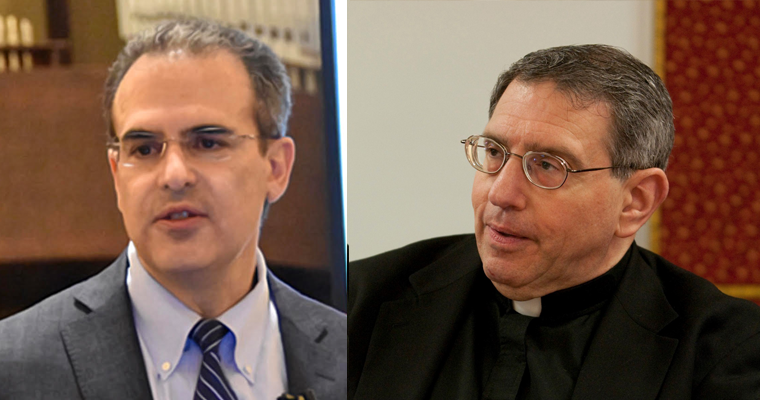By Dc Tom Cuskey
Editor
It’s a sure thing.
One day, each of us is going to be called home to heaven (we hope). In a Catholic newspaper, a reader might expect the rest of this story to focus on the spiritual aspect of end-of-life situations, but this piece is more about the physical realities we may face, and why it makes good sense to have a health care proxy in place.
Father Charles Vavonese and Dr. Paul Fiacco have teamed up in recent years to educate and inform about Catholic teachings on end-of-life issues. Father Vavonese is a published author on the topic and, retired from parish life, has served as a chaplain visiting palliative patients in their homes as a member of the St. Joseph’s Mobil Integrated Services Team (MIST). Dr. Fiacco is also associated with St. Joseph’s as he is president of the integrated network of providers, CNY AIM, and medical director of Trinity Health Integrated Care ACO, in addition to his CNY Family Care practice in East Syracuse. Both men are staunch advocates for health care proxies as part of one’s planning for future health needs, with special emphasis on our Catholic faith.
Medical technology has achieved “amazing things that we can do” says Fr. Vavonese. There are many procedures that can be performed today that weren’t possible in the past. “The question becomes ‘should we do it,’” according to Father. He explains that, depending on one’s situation, the questions of ordinary versus extraordinary care may need to be answered. The health care proxy prepares one to do that.
“What the health care proxy does is designate an individual to make medical decisions for you should you become unable to make them for yourself,” Fr. Vavonese says, adding that the proxy gives patients a voice in their care regardless of their current condition. By designating a proxy, Father says the patients are stating, “This is the person I want to have make my decisions for me and these are some of the things that I want.”
From a medical professional’s perspective, Dr. Fiacco adds that the proxy “enables the physician to guide health care decisions with respect to the patient’s goals and values when the patient doesn’t have the ability to speak.” He adds that these decisions do not take precedence over choices patients may make if they are still able to communicate for themselves.
Fr. Vavonese says people who are not senior citizens often think that they don’t need a health care proxy. “To that, I would respond that, if you’re over 21, everyone needs a health care proxy.”
From the standpoint of planning, Fr. Vavonese says the person selected “might not always be the most obvious person, not necessarily the oldest child,” for example. In considering one’s choice for the proxy, Fr. Vavonese lists some qualities to consider: The person should be of good moral character, someone who understands the patient’s Catholic faith and related personal wishes. The proxy also should be someone who is accessible and, more importantly, can operate well in a stressful situation, being able to deal with the pressured environment.
Legal representation is not necessary to complete the proxy form and Fr. Vavonese says there are any number of health care proxy forms available today. He cautions that while people can use any one they like, they should be careful to select one that complies with their wishes and Catholic faith.
He says the document enables the proxy to say on the patient’s behalf that “I’m Catholic and want to be treated according to the tenets of my religion. I want the Sacrament of the Sick. I want treatments that will benefit me, or ordinary care, I don’t want treatments that will not benefit me, or extraordinary care, and I do not want treatments that my health care proxy determines to be burdensome.”
He advises that people should “take the health care proxy (form), the advance care directives, the Catholic Guide to End of Life, put them together and give them to their health care proxy, and to all their physicians. Take them to the hospital with you, give them to other family members.
“It’s important that family members know who you have designated to make their decisions, and what types of decisions you want them to make. This will help inform them.”
Dr. Fiacco states, “It’s important to know that choosing not to have aggressive medical treatment is different from refusing all medical care. This is typically discussed with patients with terms such as ‘ordinary and extraordinary care.’” Depending on a patient’s situation, when dealing with an advanced terminal illness for example, he says, “Your goals transition from anticipating a cure to more about comfort. As a serious illness progresses and a cure becomes less likely, comfort care becomes more of the desired result of medical treatment rather than a cure.”
Dr. Fiacco advises that “having a conversation with primary care providers about these documents is the best way to achieve your goals and wishes.”
TWO GOOD RESOURCES:
Catholicendoflife.org — a “wonderful resource when one is wondering about what to put in their proxy,” according to Fr. Vavonese. The website has a feature that details resources on a state-by-state basis.
ncbcenter.org — the National Catholic Bioethics center offers a downloadable form for $3. It is very reflective of the Catholic faith, according to Father, “but in addition, it includes an advance medical directive that gives guidance to the person who is the health care proxy.”






